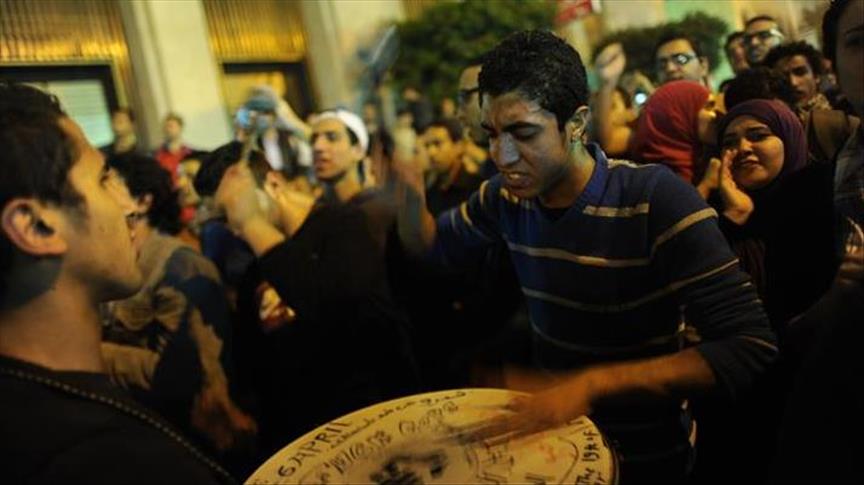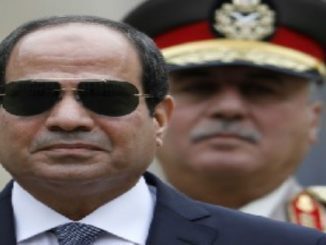
Islam Khalil was transferred to the Second Raml Police Station in the city of Alexandria in preparation for release after a court ordered his release on bail of 50,000 EGP (approximately £4,250). But instead, the Egyptian detainee-who was enforcedly disappeared for 122 days and tortured, was beaten till he lost consciousness.
Islam was beaten with pipes all over his body until he became unconscious, suffering injuries to his face, hands, and head, according to his brother Nour Khalil.
Moreover, the police officers brought fresh charges against him including the accusation that he physically assaulted a police officer.
The rights organization said that he is now in solitary confinement awaiting questioning by a prosecutor and has been denied access to his family and lawyer.
Amnesty said that”it appears that the Egyptian authorities are refusing to release Khalil in retaliation for national and international campaigning efforts on his behalf.”
When the police officers attacked him they were heard to say,“Is this whole noise to pressure for your release? We will not release you unless you are dead,” reported the rights group.
In 2015, Islam Khalil was forcibly disappeared for 122 days after being abducted together with both his brother and father from his home by agents of Egypt’s National Security Agency.
He was held blindfolded and handcuffed in solitary confinement and was beaten, given electric shocks and suspended by his wrists and ankles for hours at a time. He has been denied access to a doctor, his family, and a lawyer.
The BBC has released a documentary on the enforced disappearance titled:” The Egyptians Who Disappear” which was reported by Middle East Observer . The documentary spots the light on enforced disappearances by highlighting the case of Nour Khalil, Islam’s brother, and a human rights activist, who narrated his experience.
Nour Khalil said that on 24 May 2015, the Egyptian security forces stormed his house and they broke down the door. A large number of security forces were veiled and came with machine guns; Nour was scared from the scene and they covered his face while he was asking them not to beat him. Nour was taken to an unknown location. Once he reached there, he was grabbed by his hair and they put him in a cell. In the cell, he was blindfolded and the smell was really horrible, Nour said. Then a man approached toward Nour and started to threaten him saying, “You can end up dead. “He also told him that his father and brother were here and that they will remain here till he confesses.”
Five days later, Nour was released with no charges. They told him, “We are going to release you now, don’t talk to anyone, don’t talk to the press, but your father and brother will remain here to guarantee you didn’t talk with anyone.” After 15 days his father was released, but his brother Islam wasn’t.” After 122 days they had no news on him,” said Nour. He added, “We didn’t know whether he is alive or dead. “People were telling them to look for him the morgue.
After his disappearance, Islam was charged with belonging to a terrorist group and inciting violence. Islam denies all the charges raised against him. The next day, when his brother Nour went to visit him, he walked past by him but he didn’t recognize him as he had long hair and beard. He was wearing the same clothes he had since his arrest 122 days ago . He smelled really bad and on his neck there were signs of torture.
Regarding Islam’s case, Magdalena Mughrabi, Deputy Director of Amnesty International’s Middle East and North Africa, said, “The police officers’ refusal to comply with the court order demanding Islam Khalil’s release from custody shows the Egyptian authorities’ shocking disregard for the rule of law.”
She added,“His case highlights how crucial it is for Egypt’s authorities to stamp out the use of enforced disappearances, torture and all other forms of ill-treatment. They must urgently release Islam Khalil now and open an investigation into his allegations of torture and other ill-treatment and bring those responsible to justice.”
Since the military coup in 2013 led by Abdel Fattah al-Sisi against the first democratically elected president Mohamed Morsi, hundreds of political opposition to the coup were tortured, enforcedly disappeared, detained and even killed in protests or in prisons as a result of medical negligence .
In fact, enforced Disappearance has become an obvious phenomenon in Egypt. Human Rights organizations have documented many cases where activists were abducted by the Egyptian security forces. Even foreigners were targeted in Egypt. On the fifth anniversary of the January Revolution, the Italian Ph.D. Student Giulio Regeni disappeared in Cairo. A week later, he was found tortured and murdered with the signs of the Egyptian security forces that are known for using torture to obtain information or coerced confessions from the detainees. Regeni’s family has accused the Egyptian security forces of being behind their son’s murder, an accusation that the Egyptian authorities denied. However, human rights groups claim that this was far from an isolated case. The Egyptian Commission for Rights and Freedoms says it documented 544 cases of enforced disappearance between August 2015 – April 2016 although Egyptian authorities maintain they are being “smeared”. They say, “About half of those who disappear reappear in prison,” they added, “the whereabouts of the other half remains unknown.”
The Egyptian authorities usually deny the presence of enforced disappearances. In an interview with the BBC, the Ministry of Interior said, “There is no enforced disappearance in Egypt and these are smear campaigns.”
However, human rights groups claim that this was far from an isolated case. The Egyptian Commission for Rights and Freedoms says it documented 544 cases of enforced disappearance between August 2015 – April 2016 although Egyptian authorities maintain they are being “smeared”. They say, “About half of those who disappear reappear in prison,” they added, “the whereabouts of the other half remains unknown.”



